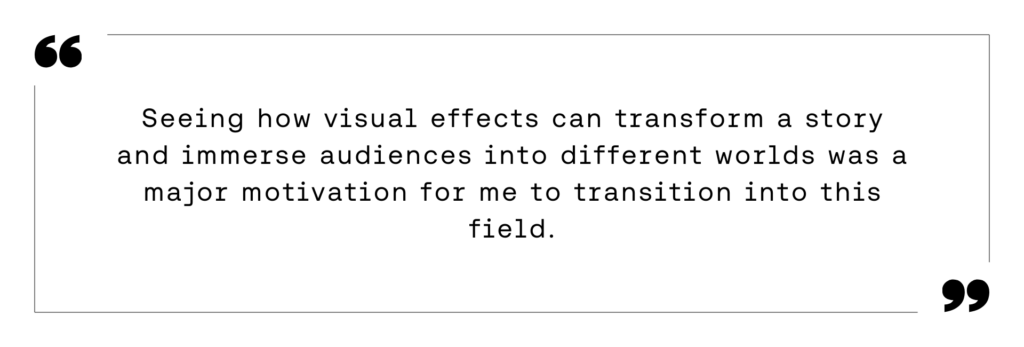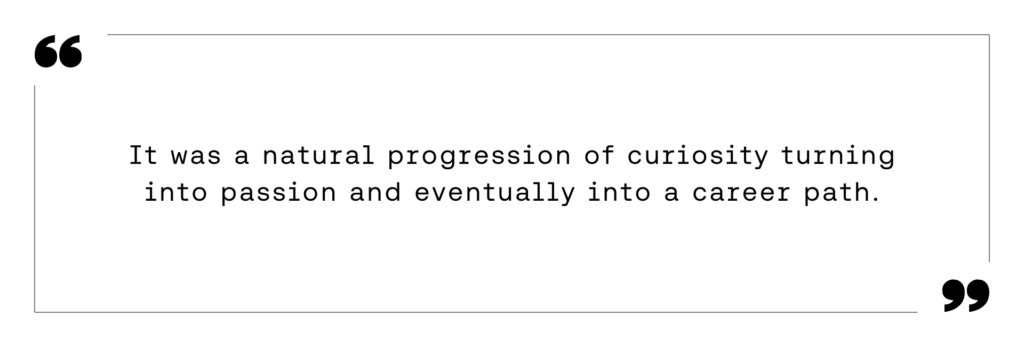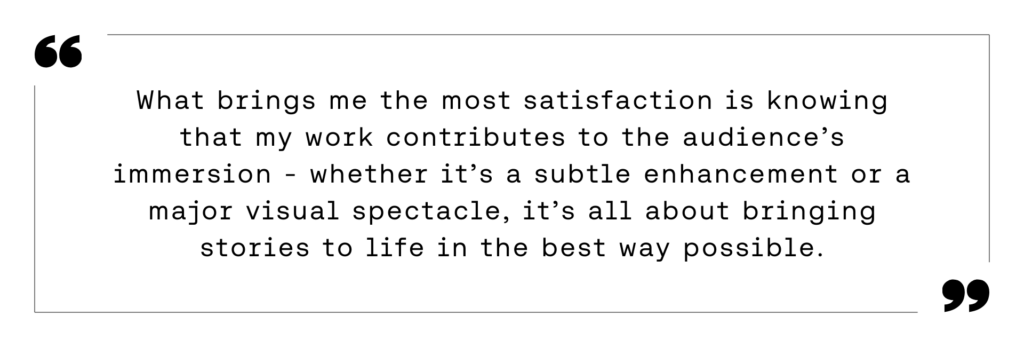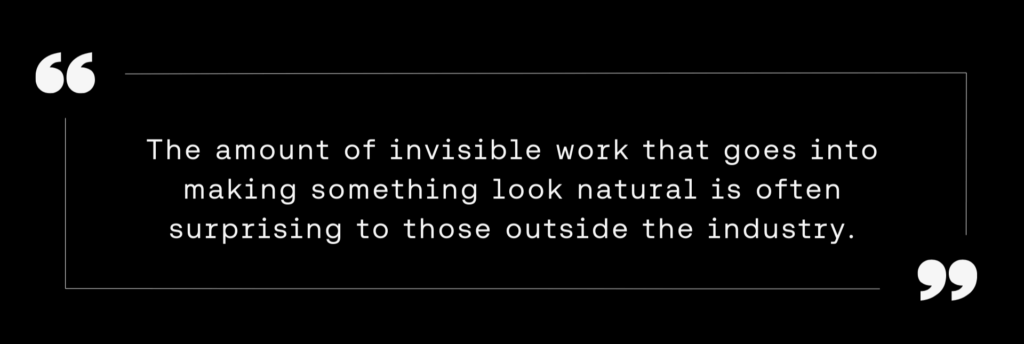Episode 10: Lilia Collar
Welcome to Behind the Pixels, an exclusive interview series that takes you on a captivating journey into the world of visual effects through the perspectives of our talented individuals.
For our 10th episode, we are thrilled to chat with Lilia Collar, who recently returned to UFX Studios.
It has been nearly 8 years since Lilia Collar joined the captivating world of VFX creation. Throughout the years, she has worked at several illustrious studios, including Digital Domain, Framestore, and Mikros Animation, before returning to UFX Studios earlier this year. Lilia has put her skills to good use on various AAA VFX projects, such as « Agatha all Along« , « Secret Invasion« , « She-Hulk » and « Spider-Man: No Way Home« , further building up her reputation as an experienced and versatile VFX artist.
In this episode, Lilia guides us through her VFX journey, from her discovery of the sector at a beloved Belgian Animation Film Festival, to the changes and evolutions she has noticed in the industry as a Lead Compositor.
Having worked on various superhero projects, make sure to stick around until the end to find out which superpower she would like to master the most! 🦸

Welcome to the UFX team, Lilia! What are you most looking forward to and are there any challenges you are gearing up to tackle?
Thank you! I’m really excited to both be back home and at UFX Studios. What I look forward to the most is contributing to high-quality projects that push creative and technical boundaries. Every project brings unique challenges, and I anticipate that balancing artistic vision with production constraints will be a key aspect of my role. Ensuring a smooth workflow within the team while maintaining the highest visual standards will be both exciting and demanding.

You have not always worked in the VFX industry, what made you want to work for this sector?
I’ve always been passionate about visual storytelling and the power of images to evoke emotion. The VFX industry offers a perfect blend of creativity and technology, which really appealed to me. Seeing how visual effects can transform a story and immerse audiences into different worlds was a major motivation for me to transition into this field.
Was there a specific trigger or event that led you to pursue a career in the VFX industry?
Yes, there was a defining moment! My personal fascination for animation of all kinds, means I attend Anima, The Brussels International Animation Film Festival, every year. It was there, that I heard the local industry was looking to train and subsequently hire a group of highly specialized profiles. After some research, I decided to pursue this route. This provided the unique opportunity of being directly trained by professionals on the field and enabled me to get a foot in the door.
Can you take us on a journey through your thought process when you first considered stepping into the world of VFX?
I asked myself what truly excited me, and the answer was always related to visual storytelling and digital artistry. At heart, I have always been a mix of pragmatism and idealism. I love to tell stories, particularly ones that matter, while also not worrying about what comes next. VFX is the perfect mix of having a creative outlet with a technical background and sufficient market demand to meet all of the above. I then took steps to deepen my technical knowledge, refine my artistic sensibilities, and gain experience on real projects. It was a natural progression of curiosity turning into passion and eventually into a career path.

Could you briefly explain what being a Lead Compositor entails? How do the responsibilities attached to the function differ from a regular Compositor?
A Lead Compositor is responsible for overseeing a team of compositors, ensuring that shots are delivered at the highest quality while meeting production deadlines. Beyond working on complex shots, my role involves setting workflows, providing artistic and technical guidance, and maintaining consistency across sequences.
Unlike a regular compositor, who primarily focuses on their assigned shots, a Lead Compositor has to think about the bigger picture—collaborating with other departments, troubleshooting challenges, and ensuring a smooth pipeline for the entire team. The scope of the role, may also vary depending on specific companies, projects or even management teams.
What are the biggest challenges you face as a Lead Compositor? In your opinion, what’s the key to balancing artistic vision with production constraints?
One of the biggest challenges is managing time efficiently while maintaining artistic integrity. Deadlines can be tight, and revisions are inevitable, so it’s crucial to stay adaptable.
The key to balancing artistry with production constraints is clear communication and prioritization—understanding what elements truly enhance a shot and focusing energy where it matters most. Working closely with supervisors and artists ensures that the final result is both visually stunning and delivered on time.
Is there a specific project that you are particularly proud of? What brings you the most satisfaction regarding the productions you’ve worked on?
As odd, as it may sound, it’s always hard for me to choose just one, or even two or three. I look at them as timelines or multiverse journeys. Sometimes I am a first time visitor of this particular universe and some others I am a returning traveller. In all cases, I try to learn new perceptions, depths and even words. I then put this acumen to the benefit of the story. What brings me the most satisfaction is knowing that my work contributes to the audience’s immersion—whether it’s a subtle enhancement or a major visual spectacle, it’s all about bringing stories to life in the best way possible.

Have you noticed significant changes in the VFX industry over the years? Are there trends or technological evolutions in Compositing that impact the way you are currently working?
Absolutely! One of the biggest shifts has been the increasing use of AI-driven tools, which are streamlining certain aspects of compositing. Additionally, improvements in machine learning-based techniques have enhanced efficiency. While technology evolves, the core artistic principles remain the same, and adapting to new tools while maintaining strong real world artistic fundamentals is key.
What’s an aspect of your job that surprises people or that most wouldn’t expect?
Many people assume that VFX work is all about flashy effects, but a lot of compositing is actually about subtle enhancements—adjusting lighting, removing unwanted characteristics, and ensuring continuity. The amount of invisible work that goes into making something look natural is often surprising to those outside the industry.

For anyone willing to step into the VFX industry, what advice would you give them to grow and thrive in this sector?
Keep learning, get a mentor and be persistent. The VFX industry evolves rapidly, so having a strong foundation in artistic and technical skills is essential, but so is adaptability. Networking and seeking mentorship can open doors, and never underestimate the power of a strong demo reel—it’s your best tool to showcase your skills and stand out.
To end on a lighter note, if you could get a superpower inspired by some visual effects, which one would it be?
Definitely super speed or time manipulation if the first one is not available! Being able to speed up would be a game-changer, both for meeting deadlines and for perfecting every detail in a shot. Plus, imagine all the creative possibilities that would come with it!